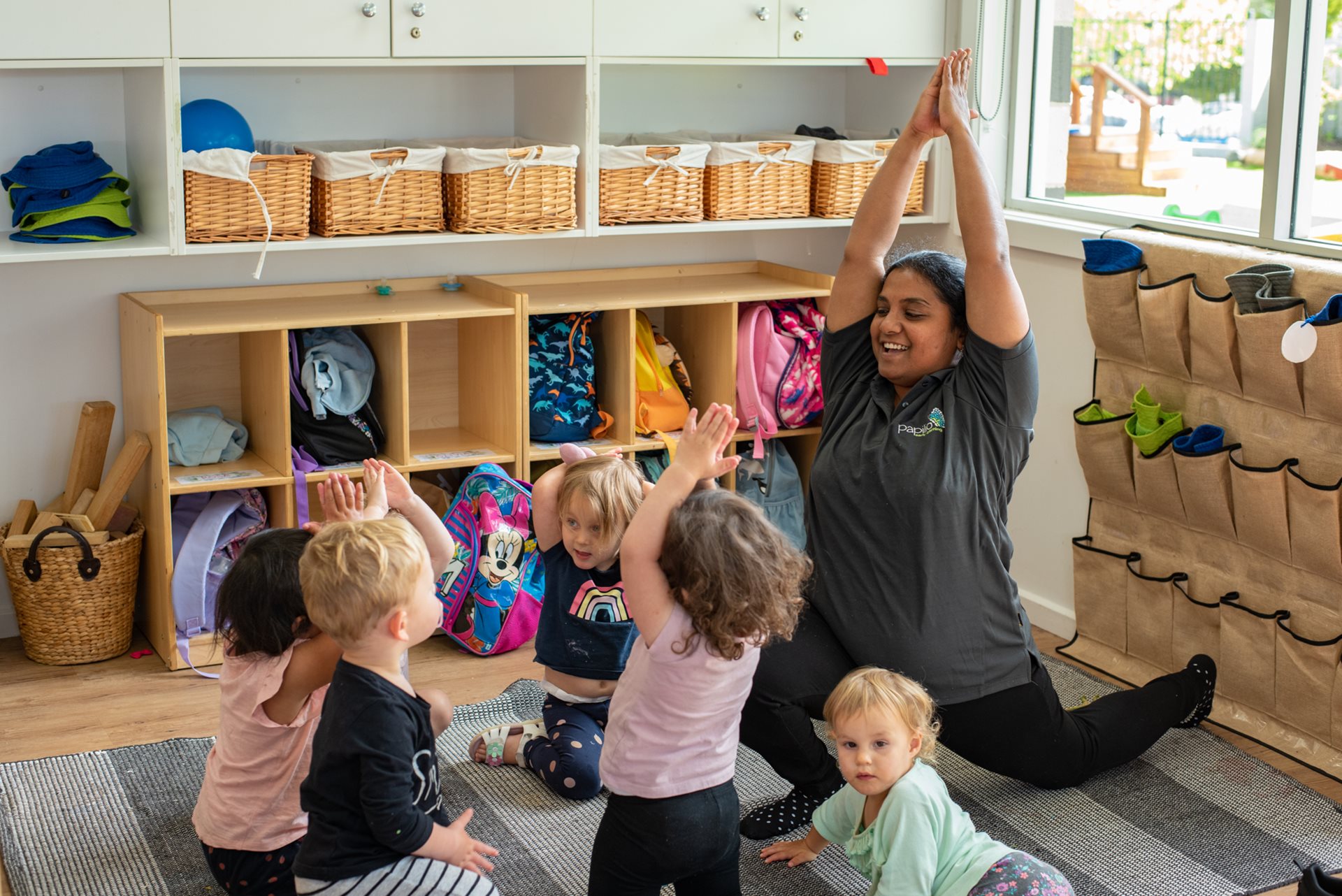
If your toddler seems to have boundless energy or your preschooler moves like they’re auditioning for a gymnastics show – you’re in good company.
At Papilio Early Learning, we understand that movement is more than just a way for young children to burn off steam – it’s a vital part of how they grow, learn, and build confidence. That’s why we’ve created a free Movement Moments cheat sheet for parents – an easy-to-use printable with quick, low-prep ideas you can pop on the fridge to support your child’s development at home. You’ll find the download further down in this post.
From baby steps to bold leaps, every wiggle and wobble helps your child develop coordination, strength, and essential brain connections.
Why Movement Is So Important in the Early Years
Children under five are naturally active – movement is how they explore the world around them and begin to understand their place in it. These large muscle movements, also called gross motor skills, play a key role in:
- Building strength, balance, and coordination
- Supporting brain development and attention
- Developing spatial awareness and body confidence
- Preparing children for everyday activities like sitting at a table, drawing, writing, and joining in at group time
By age 1, your child may be crawling, standing, and taking their first steps. Between 2–3 years old, running, climbing, and jumping become part of daily life. By 4–5, children are refining more complex movements like skipping, hopping, and catching.
And while every child develops at their own pace, the key is keeping movement enjoyable and pressure-free. Whether it’s dancing, yoga, climbing, or a playful game of chase – if your child is moving, they’re learning.
According to the Australian 24-Hour Movement Guidelines, toddlers and preschoolers should enjoy at least three hours of active play each day, including energetic movement like running, jumping, or climbing. That might sound like a lot, but it all adds up throughout the day!
How Movement Happens at Papilio
At Papilio, movement is a natural part of every day. Our educators intentionally create learning environments and daily experiences that promote physical development through play and exploration.
Children at our centres move by:
- Climbing, balancing and exploring in outdoor play spaces
- Dancing and stretching during music and movement sessions
- Crawling, hopping, and jumping through our learning zones
- Participating in group games, yoga, and nature play
- Helping with setup and pack-up activities (yes, lifting counts too!)
Physical wellbeing is a core focus of our Lifelong Learning Curriculum, which supports children’s development across all domains – cognitive, social, emotional, and physical.
What If Movement Feels Challenging at Home?
Some days your child may be full of energy. Other days, they may be happy to snuggle on the couch. Both are completely normal.
Here are a few ways to support active play at home:
- Go with the flow – movement helps children regulate their emotions and focus
- Make it fun – active play doesn’t need fancy equipment
- Join in – kids love when you dance, jump, or stretch with them
- Break it up – short bursts of movement throughout the day add up
- Keep it simple – backyard play, hallway races, and kitchen dance-offs all count
Try These “Movement Moments” at Home
We’ve created a Movement Moments Cheat Sheet you can print out and stick on your fridge. It’s filled with simple, screen-free activities that help build your child’s gross motor skills and keep their little bodies moving – indoors or out.
Download your free Movement Moments cheat sheet below!
These activities are a great way to connect with your child while supporting their physical development in fun, low-stress ways.
How Movement Builds School Readiness
Strong gross motor skills help children do so much more than run and jump – they also support school readiness. Good posture, balance, and upper body strength help children sit comfortably during group time, participate in classroom activities, and build early writing skills.
At Papilio, we see movement as an essential part of whole-child development – building the physical foundations that help children feel confident, capable, and ready for the next stage of their learning journey.
Growing Confident Movers and Learners
At Papilio Early Learning, we’re proud to support every stage of your child’s development – including their physical wellbeing. Through movement, children grow in strength, self-belief, and joy.
Want to learn more about our advanced learning approach?
Find your nearest Papilio centre and book a tour today.
Let’s keep those little bodies moving – and learning – together!